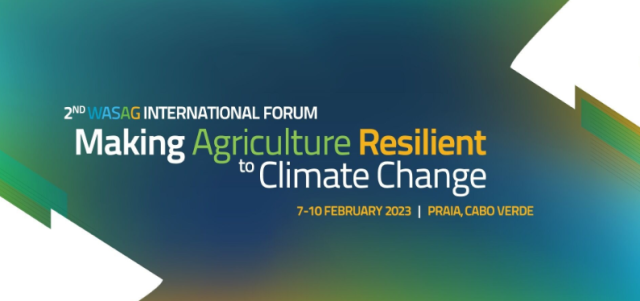“Making agriculture resilient for climate change: Water scarcity, an opportunity for action and collaboration” is the leading theme of this year’s WASAG Forum in Praia, Cabo Verde, West Africa, happening from 7 to 10 February.
Following its launch during the UNFCCC’s COP 21 in Marrakech Morocco in November 2016, the Global Framework on Water Scarcity in Agriculture (WASAG) has steadily received recognition and mandate to support countries in finding solutions to cope with climate change in agriculture in the face of climate change.
Emerging from its foundational years, WASAG held its first international forum with the theme: "Leaving no one behind" from 19 to 22 March 2019 in Praia, Cabo Verde, where the partners – under the leadership of the six WASAG working groups – developed and adopted the Praia Commitments.
With the contribution of its 70 partners, WASAG has since developed its strategy for 2021-2024. WASAG is set to further play a greater role in developing collaborative actions as solutions to the increasing challenges posed by climate change and the resulting water scarcity, in order to make agriculture more resilient. The second WASAG international forum, which is again hosted by the Government of Cabo Verde provides the setting for this step.
The forum aims to promote and position agriculture at the core of climate change discussions in view of the forthcoming events and beyond:
-
UN Water conference (New York, 22-24 March 2023) – Comprehensive mid-term review of the implementation of the Objectives of the International Decade for Action, 'Water for Sustainable Development', 2018-2028.
-
UNFCCC COP 28 (United Arab Emirates, 6-17 November 2023) – Climate Change
GWP CEE’s Project Manager, Anna Smetanova, was selected to join a consortium of specialists from FAO, WMO, IWMI and others to co-organize one of the sessions on drought resilience with a sub-topic on Social Inclusion in Drought Resilience.
The session revolved around the fact that “Drought is a silent disaster” affecting everyone, but especially women, children, elderly, indigenous people, and socially excluded groups. They are those who despite the threats of malnutrition, pre-mature deaths and threats to their mental health and well-being often continue to live in the repeatedly impacted regions.
On the bright side, projects across the globe prove the change is possible. Women, youth and entire communities are capable to be the driver of change and manage water resources sustainably and equally under the conditions of repeating severe droughts. Building their capacities without feminizing responsibility and without adding additional burdens empower them to use local and indigenous knowledge for decreasing drought impact, strengthen preparedness and response to drought events.
Combining local and indigenous knowledge with information and early warning, policies, and strategies to adapt to unprecedent changes increases.
The integration of multi-level authorities in decision making, harmonizing of state and non-state actors'responses and actions, understanding influence of colonial legacies on preparedness and mitigation plans, as well as accounting for vulnerability propagation across supply chains are important factors, that cannot be solved by marginalized groups alone.
To mainstream climate justice in drought we need to create enabling conditions for social inclusion in drought related governance, finance, and knowledge & capacity.
